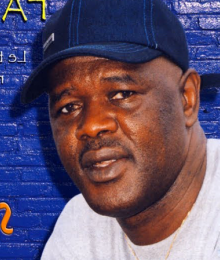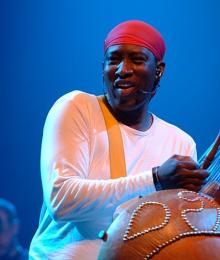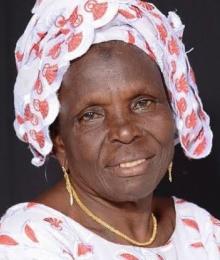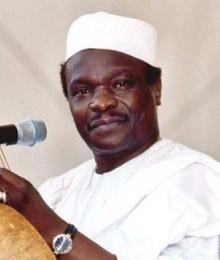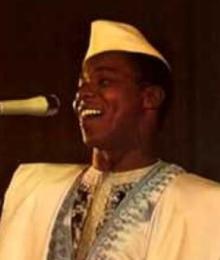
Sory Kandia Kouyaté was a master griot, musician, composer, and Guinean singer born on August 25, 1937, in Manta (Dalaba) and passed away on December 25, 1977, in Conakry. A direct descendant of Balla Fasséké Kouyaté, the designated griot of Emperor Soundiata Keita, he was renowned for his exceptional and remarkably powerful voice, earning him the nickname "The Voice of the Revolution." A close collaborator of President Ahmed Sékou Touré after independence, he became a cultural ambassador for Guinea, representing his country at the United Nations and on numerous international tours.
His genius lay in his ability to modernize ancestral Manding songs while preserving their traditional essence. His career was crowned with numerous accolades, including the gold medal at the International Folklore Festival in 1966 and the Golden Record of the Grand Prix of the Académie Charles Cros in 1970. His untimely passing at the age of 44 deprived Africa of one of its greatest voices, leaving behind an invaluable musical legacy.
Introduction
Born on August 25, 1937, in Manta (now Bodié) in the Dalaba region of Guinea, Sory Kandia Kouyaté was destined to leave a lasting mark on African music history. Coming from a distinguished lineage of griots, he was a direct descendant of Balla Fasséké Kouyaté, the legendary griot of Emperor Soundiata Keïta. This prestigious ancestry naturally placed him within the tradition of the djélis, the guardians of Manding memory and culture.
At a young age, Sory Kandia Kouyaté left the royal court of a local leader to join a community of artists, bringing him closer to the man who would later become Guinea's first president, Ahmed Sékou Touré.
Meeting Sékou Touré
The turning point in his career came in 1951 during a tournament in Labé, at the heart of Fouta-Djallon. At just 18 years old, Sory Kandia Kouyaté brilliantly animated an evening event during a tour by future president Sékou Touré. Impressed by his talent, Touré personally invited him to join him in Conakry.
In the capital, Sory Kandia first created his own troupe of 12 members before joining the prestigious Ballets Africains of Fodéba Keïta six months later. This collaboration marked the beginning of a meteoric rise that would take him to international stages.
An Exceptional Voice
Legend has it that one day, during a performance in Conakry, his microphone stopped working. Unfazed, Sory Kandia set the device aside and continued singing at full voice. The sheer power of his natural voice mesmerized the audience, showcasing raw talent and exceptional vocal mastery that no one had taught him.
His long, ample, and soaring mezzo-soprano voice had a unique ability to deeply move even the most indifferent listeners. His voice, combined with extraordinary verbal artistry, made him an undisputed master of praise, capable of delivering the boldest compliments with a subtlety that was uniquely his own.
Musical Ambassador of the Guinean Revolution
After Guinea’s independence in 1958, Sory Kandia Kouyaté quickly became "The Voice of the Revolution." Recognizing the mobilizing power of his extraordinary voice, Sékou Touré appointed him director of the Instrumental and Choral Ensemble of the National Radio Broadcasting of Guinea in 1960, then deputy director of the National Ballet Djoliba in 1964.
A true cultural ambassador, he represented Guinea at the United Nations and during numerous international tours. He traveled across Africa, Europe (France, the United Kingdom, Belgium, West Germany), the United States, and even Soviet bloc countries. His voice carried Guinea's revolutionary message and Sékou Touré's Pan-African ideals far beyond national borders.
A Repertoire Bridging Tradition and Modernity
Sory Kandia Kouyaté’s genius lay in his ability to modernize ancestral Manding songs. As an heir to epic tales and centuries-old vocal techniques, he infused them with contemporary sensibility that resonated with an international audience.
His discography reflects this successful fusion. In 1956, he recorded "Nina," "Toubaka," "Malissadio," and "Chants de réjouissance" for the Vogue label. "Nina," a love song, marked a revolutionary shift in a society where arranged marriages were the norm. This pioneering work inspired many West African singers to explore the theme of romantic love.
With the national label Syliphone, he recorded "L'époque du Mandingue" alongside Sidikiba Diabaté, as well as the albums "Conakry," "Fouaba," "Tinkisso," and "N'na." In songs like "Tara," he skillfully blended traditional balafon notes with then-popular Latin rhythms, symbolizing Africa’s openness to the world.
A Musical Diplomat
Beyond his role as an artist, Sory Kandia Kouyaté played a significant diplomatic role. In 1975, under Sékou Touré’s leadership, he contributed to easing tensions between Upper Volta (now Burkina Faso) and Mali. Through his mastery of the shared history of these nations, divided by colonization, he successfully reconciled Presidents Sangoulé Lamizana and Moussa Traoré.
International Recognition and Islamic Faith
His career was marked by prestigious awards. He won the trophy at the Bamako Festival in 1956, the gold medal at the International Folklore Festival in Sicily in 1966, the silver Honor Cup at the Pan-African Festival of Arts and Culture in Algeria in 1969, and the Grand Prize Golden Record of the Académie Charles Cros in 1970.
A devout Muslim, he performed the pilgrimage to Mecca three consecutive years, in 1973, 1974, and 1975, accompanied by his seven children and two wives.
In 1977, shortly before his passing, he participated in FESTAC 77, a major festival of Black and African arts and cultures held in Lagos, Nigeria, bringing together nearly 60 countries.
An Indelible Legacy
Sory Kandia Kouyaté’s meteoric journey was tragically cut short on December 25, 1977, in Conakry, seemingly due to a heart attack. He was only 44 years old. Upon his death, he was elevated to the rank of Commander of the National Order of Guinea.
His premature passing remains one of the most painful "what ifs" in African music history. Had he lived a few more years, he might have achieved an international career comparable to that of Miriam Makeba, whom he preceded as "The Voice of Africa."
His legacy endures, as evidenced by the Excellence Trophy awarded to him at the Guinean Music Awards in 2024. In 2015, filmmaker Laurent Chevallier dedicated a documentary to him titled "La Trace de Kandia," initiated by one of his sons, Kabinet Kouyaté.
Considered one of the greatest voices Africa has ever produced, alongside his compatriots Aboubacar Demba Camara, Kadé Diawara, and Binta Laly, Sory Kandia Kouyaté remains an essential reference in the musical history of Guinea and West Africa. His golden voice, which transcended cultures and borders, continues to move African music lovers worldwide, a testament to a talent that defies time.













